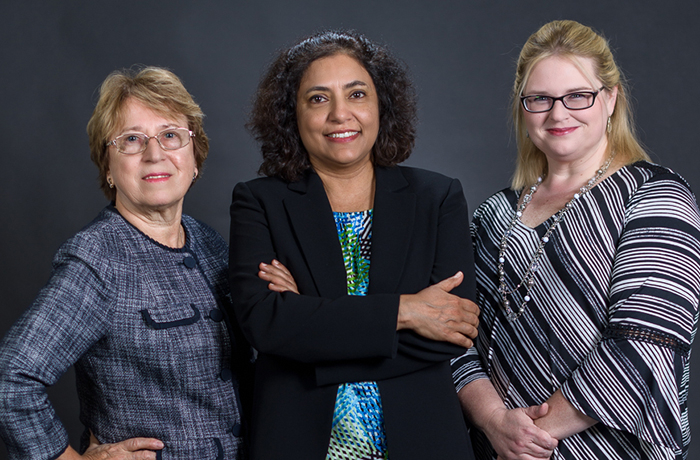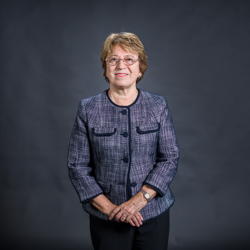
Researchers Work to Solve Important Health Questions About Stress, Mutations in Stem Cells and How the Brain Repairs Itself

Throughout September and October, the University of Arizona College of Medicine – Phoenix is highlighting women researchers and faculty who are teaching, mentoring and leading others in academic medicine.
Women in Medicine and Science Month (September) celebrates the accomplishments of women physicians and scientists and highlights advocacy related to women in health care and issues impacting women patients.

Ella Nikulina, PhD, investigates the effects of social stress on gene expression in the brain. Social defeat can act as a salient stressor that results in an increased sensitivity to psychostimulants that can persist for months after the initial stress. Her findings have revealed the neurochemical basis of intermittent social defeat stress and identified potential molecular targets to prevent stress-induced vulnerability to psychostimulants.>
Dr. Nikulina’s influence is reflected by frequent invitations to prestigious international scientific meetings. She also serves on expert review panels for the National Institutes of Health, and is a frequent reviewer of scientific journal manuscripts. Dr. Nikulina has been a faculty member of the University of Arizona College of Medicine – Phoenix, since 2007, and is an associate professor in the Department of Basic Medical Sciences.
“I am very passionate about working with students, encouraging them to study gene signaling in the brain and its connection with behavior,” Dr. Nikulina said. “I always support young women in science. I tell them to be yourself, pursue your career goals. Do what you enjoy, and you will succeed.”

“I am fortunate to have had opportunities and the support of my loved ones in pursuing my professional goals,” Dr. Sharma said. “I want every little girl and young woman in this world to have the same choices. Through my profession, I aim to provide opportunities in science and medicine.”

“It starts now, with us,” Dr. Thomas said. “As we mentor the next generation of aspiring scientists and clinicians, we have the opportunity to impart evolving scientific, social and academic principles that promote excellence, equality and job satisfaction in the future.”
If you would like more information about the Women in Medicine and Science group, please contact Julie Parrish. For information about the Phoenix chapter of Graduate Women in Science, contact Sandra Maria Hinz.
Special September/October Content:
Features with women in leadership at the College of Medicine – Phoenix:
- Ella Nikulina, PhD; Shalini Sharma, PhD; Theresa Currier Thomas, PhD.
- Rebecca Fisher, PhD; Amelia Gallitano, MD, PhD; Melissa Herbst-Kralovetz, PhD.
- Maria Manriquez, MD; Susan Kaib, MD, Cheryl O’Malley, MD.
- Taben Hale, PhD; Jennifer Hartmark-Hill, MD, Michelle Dorsey, MD.
- Suwon Kim, PhD; Karen Hastings, MD, PhD; Aparna Sertil, PhD.
About the College
Founded in 2007, the University of Arizona College of Medicine – Phoenix inspires and trains exemplary physicians, scientists and leaders to advance its core missions in education, research, clinical care and service to communities across Arizona. The college’s strength lies in our collaborations and partnerships with clinical affiliates, community organizations and industry sponsors. With our primary affiliate, Banner Health, we are recognized as the premier academic medical center in Phoenix. As an anchor institution of the Phoenix Bioscience Core, the college is home to signature research programs in neurosciences, cardiopulmonary diseases, immunology, informatics and metabolism. These focus areas uniquely position us to drive biomedical research and bolster economic development in the region.
As an urban institution with strong roots in rural and tribal health, the college has graduated more than 1,000 physicians and matriculates 130 students each year. Greater than 60% of matriculating students are from Arizona and many continue training at our GME sponsored residency programs, ultimately pursuing local academic and community-based opportunities. While our traditional four-year program continues to thrive, we will launch our recently approved accelerated three-year medical student curriculum with exclusive focus on primary care. This program is designed to further enhance workforce retention needs across Arizona.
The college has embarked on our strategic plan for 2025 to 2030. Learn more.